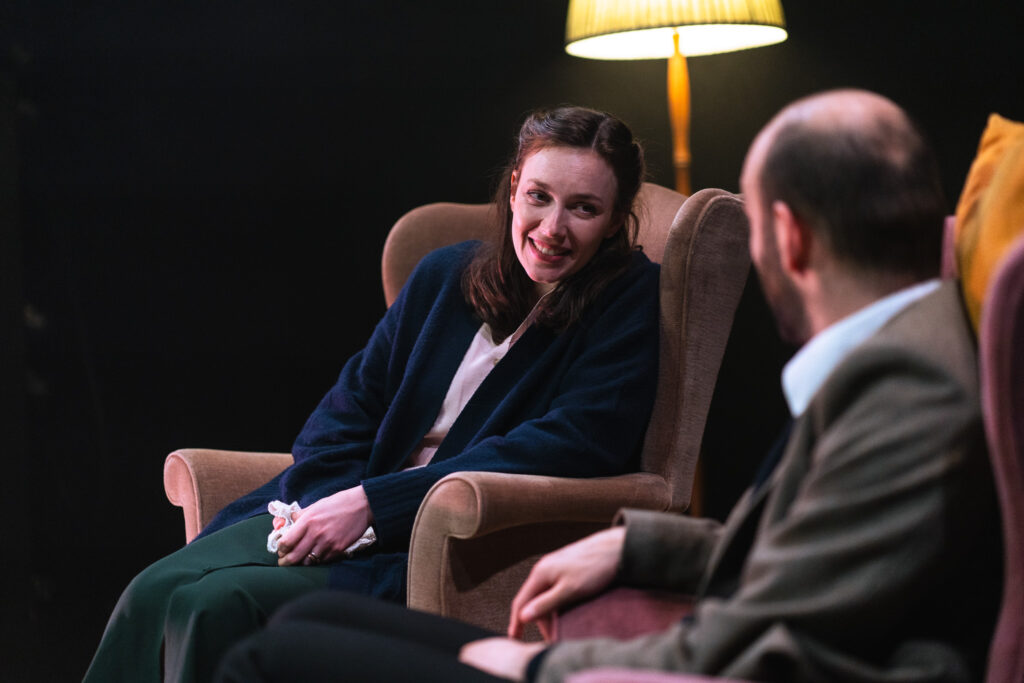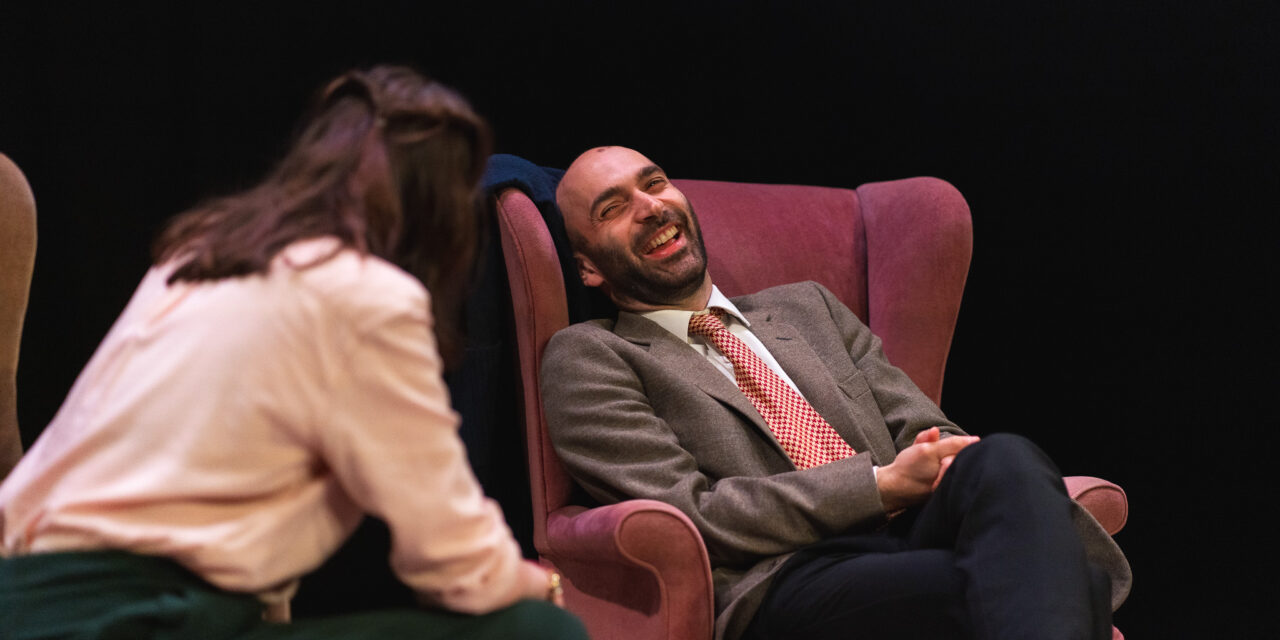
Celebrating the Power of Music and Memory:
A Conversation with Matthew Seager and Lydia White who perform In Other Words
Music has always had a profound ability to connect people — to each other, to moments in time, and to their own memories. The play In Other Words, produced by TBC Productions in partnership with Music for Dementia, is a testament to this power. This captivating love story follows a couple from the moment they meet, where they dance to a Frank Sinatra classic, through fifty years together including Arthur’s diagnosis and decline with Alzheimer’s disease. It highlights how personal music can have the ability to connect someone living with dementia to their loved ones and the world around them right through to the end of their dementia journey. With award-winning success for productions of the play in four continents, it now comes to the Ustinov Studio at the Theatre Royal Bath as part of a UK tour.
We sat down with its cast — Matthew Seager, who also wrote the piece, and Lydia White — to discuss the impact of the production and its deep connection to dementia care.
Q: Matthew, you wrote In Other Words after experiencing firsthand the profound effect music can have on people living with dementia. Could you share more about how your experience influenced the creation of this show?
Matthew Seager: Absolutely. As a drama student, I had a placement facilitating sensory stimulation workshops in a dementia care home. I experienced first-hand the totally transformative impact music can have on people living with dementia when a group of residents, who seemed in severe cognitive decline, stood and sang along to Frank Sinatra’s My Way. At the time it seemed like magic and was, I now realise, life changing for me.
It struck me how certain songs from decades ago could spark recognition and emotion in a person who, on a cognitive level, might seem far removed from those memories. The idea that music has this incredible ability to transcend time and connect us to our memories, especially in the context of dementia, was the central inspiration for In Other Words.
Q: The show has garnered attention around the world since its premiere in 2017, including major accolades like the four Molière Awards in Paris. How does it feel to see the show resonate so deeply with audiences on four different continents?
Matthew Seager: It’s overwhelming and a lot to wrap my head around. The play has now been seen by over 300 000 people in four continents with numerous more set to open this year and a feature film development. For me, it just serves to highlight the universality of these themes. Of dementia and music, yes, but also of being in love and having a desire to care for the people who mean the most to you. This play is a love story at its core and love is something we can all relate to in some form. I feel extremely lucky that so many people have seen a version of Arthur and Jane’s love story.
Q: Lydia, you’ve had an impressive career in musical theatre, including your recent role as Miss Honey in Matilda in the West End. What drew you to In Other Words, and what is it like playing Jane, a woman who’s not only part of a deep love story but also deeply connected to music?
Lydia White: There were many things that drew me to In Other Words but I think the biggest draw was Jane’s emotional arc throughout the play. We see many iterations of Jane, throughout different ages and stages of her life and I feel like the audience grow with her. It feels like a huge privilege as an actor to play such a layered, vibrant and genuine character – a huge testament to Matt for writing such a moving landscape. The story is about love and loss, and how music can be the thread that connects us through the tumultuous seasons of life. Having a background in Musical Theatre, playing a character whose life is so intertwined with the power of song feels especially congruent and important. It feels very interesting to play a character who doesn’t use singing to actively tell her story; in this play, letting recorded music influence the narrative and emotion almost feels more meaningful because the character can experience the song with the audience, rather than having to perform it to them. It feels important to listen to the song and feel the reverberated impact.
Q: As performers, both of you must feel a strong connection to the music in this show. Could you share a moment from the production where music has particularly impacted you during rehearsals or performances?
Matthew Seager: There are certainly some moments later on in the play that spring to mind immediately, but I don’t want to give away any spoilers. Arthur and Jane’s favourite Frank Sinatra song is used throughout the production and is a wonderful, poignant, recurring reminder of their unwavering love and connection to each other. We see it used to lighten the mood, to make Jane laugh, to apologise. There’s plenty of other music as well and one of my favourite moments is when we dance at the beginning of the show to Beyond The Sea by Bobby Darin.
Lydia White: The use of music in the show acts as a kind of a memory trigger for Jane as well as for Arthur. You get a sense of how music tethers them together throughout their relationship. I particularly love the moment where Arthur and Jane first hear the Frank Sinatra song that they both love – a song that will ultimately act as a steadfast anchor when they have reluctantly drifted from each other. Music lights up a part of us that otherwise may have remained dormant and ultimately gives us access to a vivid sense of belonging, emotional recall and love.
Q: This show is about a relationship that spans decades, and it highlights how love, and music, evolve over time. How does In Other Words speak to the way we experience love and memory as we age?
Matthew Seager: It’s fascinating because as time passes our memories can sometimes become hazy, I know mine do, but music can have this unique ability to bring those memories back to the surface with emotive and vivid clarity. I think Arthur and Jane show us that to be in love for so long, to build and live a life together, means integrating part of who you are, and of how you remember who you are, with that other person. The show highlights how love can remain constant even as everything else changes — and music can be an amazing vehicle that keeps those memories and connections alive.
Lydia White: As we grow older, memory becomes intrinsic to who we are. For Jane and Arthur, the music they’ve shared throughout their lives becomes more than just background noise — it’s their way of holding onto each other, even when difficulty pulls them apart. Jane’s final speech in the play interrogates this idea – what can remain of ourselves when memory deserts us and why do we cling onto certain moments. It feels that in this play, the love the characters have for each other remains just as strong as it did when we first meet them, but circumstance has made it almost impossible to navigate it.
Q: What do you hope audiences take away from In Other Words?
Matthew Seager: As well exploring themes surrounding dementia, music and care, the play is at its purest, about love and hope. That is absolutely essential, so I hope audiences feel that. I think it’s possible to leave the theatre with both a smile on your face and tears in your eyes. If that happens, then we’ve done our job. I know, for me, the first thing I want to do after coming off stage is find all the people I love and hug them!
Lydia White: I hope audiences leave with a renewed sense of appreciation for the love in their own lives. The play is a testament to care and to carers. The story is a celebration of human spirit, the power of music and endurance and hopefully through these characters, people can feel seen.
In Other Words appears at the Ustinov Studio at the Theatre Royal Bath from Thursday 17th to Saturday 19th April. Tickets are on sale at the Theatre Royal Bath Box Office on 01225 448844 and online at theatreroyal.org.uk/ustinov
Photography credit: Tom Dixon


